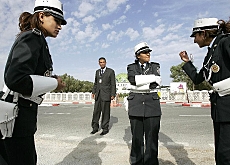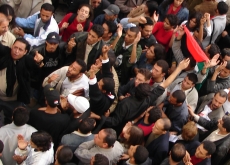The peaks of an information summit

After covering Switzerland's involvement at the World Summit on the Information Society in Tunis, swissinfo's Thomas Stephens looks back at a memorable week.
Tunisia had always been a contentious location for an information summit given its well-documented human rights abuses and media censorship.
Monday 14
Our Tunis Air flight lands less than two hours after leaving Geneva. Geographically, Tunisia and Switzerland are closer than much of America is to New York. But far more separates the two than a stretch of blue Mediterranean and some mountains.
Security is extremely tight as the world’s media descend. The atmosphere in the bus is a mixture of uncertainty, excitement and determination.
A banner between two palm trees flutters into view just outside the airport: “Welcome to the country of tolerance, solidarity, openness and dialogue”.
On checking in at the hotel we are presented with a pink drink whose Arabic description sounds disturbingly like “sodium pentothal”. I’m so thirsty I have two. Smooth on the surface but with a hidden kick. Typically Tunisian apparently.
That evening we meet various representatives of Tunisian and international civil society in the back enclave of a restaurant owned by someone with pro-democracy sympathies. This is at great personal risk – many buildings suspected of aiding the opposition have been shut down. Press releases are subtly being passed around face down.
The 20-minute taxi ride costs the equivalent of SFr1 ($0.76).
Tuesday 15
How many policemen does it take to man a road barrier? Seldom fewer than six in Tunisia, it seems. Unemployment is a serious problem for the Tunisian government but it’s hard to see why: the number of policemen, security staff and “observers” is extraordinary.
We arrive at the Kram Palexpo, the enormous compound in which all the official summit events are taking place. If your name’s not on the list, you’re definitely not getting in. In fact you’d do well to get within 5km of the place.
Having said that, all the staff – from the friskers to the technical support – are genuinely friendly and helpful under high-pressure conditions. Indeed the facilities and organisation can’t be faulted.
Wednesday 16
“The Americans deserve our tanks,” declares Kofi Annan, the Ghanaian UN secretary-general, at the summit’s opening ceremony. My ears prick up. I glance at the US delegation. It seems the interpreters didn’t fall for that as easily as I did.
The Tunisian president, Ben Ali, then invites Swiss President Samuel Schmid to take the podium. Schmid thanks his host and promptly launches into an unprecedented condemnation of UN countries – read Tunisia – which don’t allow people to speak their mind and which lock up those who do.
Schmid receives a rousing round of applause from delegates and is hailed by several civil society reports as the “William Tell of Tunisia”.
At a packed press conference later in the day Annan introduces Nicholas Negroponte, who launches the much-anticipated $100 laptop. It looks very Fisher-Price and its screen has frozen but it would be churlish to nitpick – this piece of technology really could make a difference and is refreshingly concrete at a summit full of promises and recommendations.
Negroponte is impressive but Schmid is the name on every journalist’s lips. We have just discovered that Tunisian state television has filleted Schmid’s speech leaving only the initial platitudes.
Flagging up my Swissness, I suddenly find myself fielding a battery of questions about him. “How do you spell his surname?” is by far the most common question.
Thursday 17
Soon after waking up, I discover that swissinfo is inaccessible in Tunisia outside the media centre. Some visits to cybercafés in the capital suggests that our site has been blocked. A message from our Arabic service in Bern confirms that Tunisians outside the capital can’t access swissinfo either. They could on Wednesday.
I see a man in the street holding up and reading a newspaper. Good to see people accessing the media I thought – but then I swear I see two eyeholes…
Political blogs written inside Tunisia are few and far between. The nearest you get are columnists in the state “edited” newspapers. Not that you have a choice, but you don’t want to turn to them for objective news.
According to “Alya” in La Presse, for example, at the summit registration “queues are not long and are moving quickly”. Alya clearly had access to either a diplomatic badge or some dodgy sources since all other delegates spent at least three hours shuffling along in the searing sun.
I discover that today is William Tell Day. He is said to have shot the apple off his son’s head exactly 698 years ago.
Friday 18
The last day of the summit on the Information Society, and virtually all we have seen, heard and written is about censorship and human-rights abuses.
I decide to pop along to a press conference given by a Russian on the role of technology in government or vice versa. There’s evidently a lot to say, because this is going on for a long time even though everyone’s exhausted and the room is like a sauna. No story there.
My last appointment is the closing ceremony. The Swiss communications minister, Moritz Leuenberger, has picked up the baton from Schmid, and delivers a conspicuously low-key speech.
As swissinfo and Swiss colleagues InfoSud pack up for the last time, we receive a round of applause from other journalists! I wasn’t expecting that when we arrived.
swissinfo, Thomas Stephens in Tunis
The three-day second phase of the World Summit on the Information Society (WSIS) has drawn to a close in Tunis.
More than 17,500 delegates from 176 states have attended, including 5,600 governmental representatives, 5,600 NGO members, 3,600 people from the private sector and 1,000 journalists.
Swiss President Samuel Schmid’s opening speech was censored for saying UN states that restrict civil liberties was “frankly unacceptable”.
After Schmid made his remarks the swissinfo website suddenly became inaccessible in Tunisia, apart from in the media centre.

In compliance with the JTI standards
More: SWI swissinfo.ch certified by the Journalism Trust Initiative













You can find an overview of ongoing debates with our journalists here . Please join us!
If you want to start a conversation about a topic raised in this article or want to report factual errors, email us at english@swissinfo.ch.